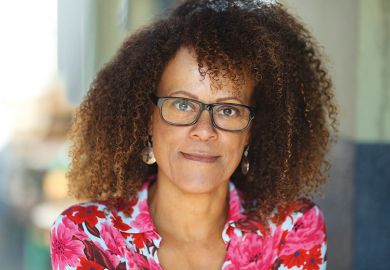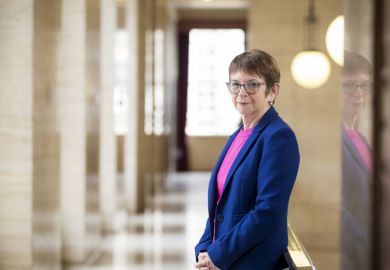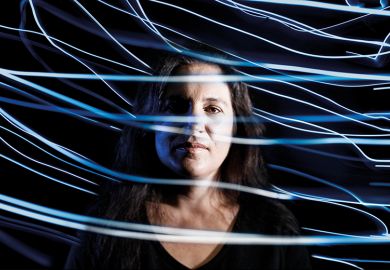Greg Graffin is the lead vocalist and songwriter of US punk rock band Bad Religion and a visiting scholar in the department of ecology and evolutionary biology at Cornell University. His most recent book, Population Wars: A New Perspective on Competition and Coexistence, published in 2015, argues that misunderstandings around evolutionary theory have allowed societies to justify wars when other, less violent, solutions are available. Bad Religion’s 17th studio album, Age of Unreason, was released earlier this year.
Where and when were you born?
Madison, Wisconsin, 1964.
How has this shaped who you are?
I have deep roots in Wisconsin. I went to school and university there, and my dad – a native Milwaukeean – still lives in the house I grew up in in Racine. So, Midwestern pragmatism is a big part of who I am. Like Bill Murray, it informs my sense of humour; like [environmentalist] Aldo Leopold, it shaped my love of the outdoors.
What kind of undergraduate were you?
I loved to dig around in the research libraries and to prowl the collections of the natural history departments, but I didn’t really enjoy studying for “required” courses outside my interests. I tried to enrol in at least one course every quarter that allowed me to go camping. This meant that I took a lot of “ology” courses that dealt with natural science and fieldwork.
Being a rock star is a pretty cool job. Why did you decide to work in academia as well?
Believe it or not, I never considered music a “profession”, even after many years of earning a good living while recording albums, songwriting and touring. Music comes so naturally to me, and I’ve always been successful at it, so I always considered it a gift when people paid to hear me sing. I always thought that at any moment someone could take that gift away and, therefore, it wasn’t really secure. I know this sounds insane, but I never wanted to give up on academia because it was so rewarding to work towards figuring out natural science problems. Regardless of the low pay, long hours and endless dedication [required], I was determined to achieve something that nobody could take away from me. Thankfully, I’m a bit more mature now, and I like to balance both music and academia. And I, of course, realise that nobody can take away my achievements in music, either.
Tell us about your PhD on evolution and religion.
Evolution and religion were always part of my philosophical interests. I was only 15 years old when we decided to call the band Bad Religion. This was precisely the time I started thinking of science as a viable worldview, since my parents insulated my brother and me from theology entirely. So, I was intrigued to find out what my cohorts in evolutionary biology thought about the conflict between theology and the Darwinian worldview. To my astonishment, I found that despite nearly a 98 per cent adherence to atheism among the most prestigious evolution scientists, there still was general acceptance of a theistic or deistic worldview when it came to the question “are evolution and religion compatible”. Charles Darwin would turn in his grave if he read these results.
To what extent is your music influenced by your scholarly interests and vice versa?
I’ve found that my best writing comes when I am pursuing songwriting and academics simultaneously. This must mean that parts of the brain that process data can easily switch between musical data and data from natural science.
Do you think you have the potential to have more influence than other scholars because of your high-profile music career?
Yes. I used to not think so. But nearly every chance I get to meet people (after concerts, at book signings or even in “fan mail” communications in my academic inbox), I hear a repeated story that goes something like this: “I had a challenging life, I was drawn to your music, it helped me through tough times, now I’m a student at university (or nowadays, I’m a professor teaching so-and-so), and you served as a role model for that. So thank you.” Lately, I’ve been thinking about it, and I often see “lists of pedigree” of certain important professors – where the measure of a professor’s importance is listed as her students who went on to be academics. Really important professors have maybe 25 or 30. But I figure there are hundreds, perhaps thousands, of students who I’ve influenced through Bad Religion, and easily a hundred or more professors – some I’ve taught and some who’ve come to me and let me know that they were fans. That’s an interesting way of measuring the influence of my music on the next generations of academics. It is, incidentally, something for which I do feel great satisfaction.
Are you ever the victim of snobbery from other academics who think you’re not a ‘real’ scholar?
I find that snobbery is easily equated with jealousy. I find it in academia, yes – but no less frequently than in entertainment and the music industry, too. I feel I’m not taken as seriously by some academics because I can’t devote all my time to it. Likewise, I’ve felt the snub from musicians who just think of me as a “college boy”. But, in general, the chairs of my departments and my musical mates have always accepted and championed my plurality.
How do you think universities should respond to the rise in populism and far-right extremism?
Universities are supposed to be bastions of free thinking. That doesn’t mean that all free thought is appropriate to the university curriculum. The best fight against populism and extremism is to have teachers who are dedicated to discovering the truth about the world, finding facts and openly sharing them. We have to teach that it’s worthy to bring up controversial issues, but at the same time reject agendas that ignore discoveries and facts about the world.
ellie.bothwell@timeshighereducation.com
Appointments
Marnie Hughes-Warrington has been announced as deputy vice-chancellor for research and enterprise at the University of South Australia. Professor Hughes-Warrington, who will take up the post in January, is currently professor of history at the Australian National University, where she served as deputy vice-chancellor between 2012 and 2018. Before that, she was pro vice-chancellor (learning and teaching) at Monash University. David Lloyd, vice-chancellor of the Adelaide institution, said Professor Hughes-Warrington was an “exceptional appointment”. “Marnie is a highly respected academic and someone who has brought energy and innovation to her academic career and operated successfully in leadership positions,” he said.
Yvonne Barnett has been named deputy vice-chancellor (research and innovation) at Anglia Ruskin University. She was previously senior pro vice-chancellor (research) at Nottingham Trent University, where she has also held the position of pro vice-chancellor for research and head of the College of Arts and Science. The biomedical scientist said she would focus her “experience and passion for higher education, and particularly research and innovation, to work with staff, students, collaborators, partners and funders to ensure that ARU continues to develop as a leading UK university”.
Vlado Perkovic has joined UNSW Sydney as dean of medicine. The former executive director of the George Institute of Global Health has taken over from Rodney Phillips, who has moved to the new role of pro vice-chancellor, health. Professor Perkovic, a kidney specialist, said medical schools had “a mandate to help society move forward and tackle our collective challenges”.
Dawn Scott is the new head of life sciences at Keele University. Professor Scott, who joins Keele from the University of Brighton, is a professor of mammal ecology and conservation who has previously served as deputy head of research and enterprise and assistant head in Brighton’s School of Pharmacy and Biomolecular Sciences.
Register to continue
Why register?
- Registration is free and only takes a moment
- Once registered, you can read 3 articles a month
- Sign up for our newsletter
Subscribe
Or subscribe for unlimited access to:
- Unlimited access to news, views, insights & reviews
- Digital editions
- Digital access to THE’s university and college rankings analysis
Already registered or a current subscriber?




